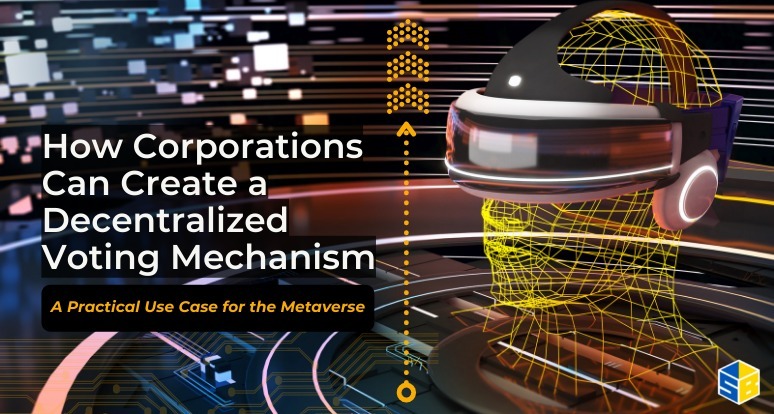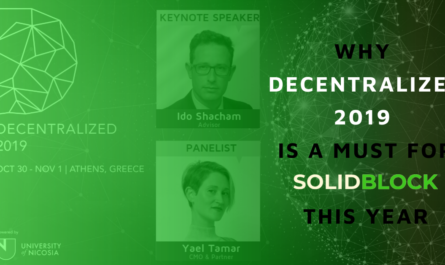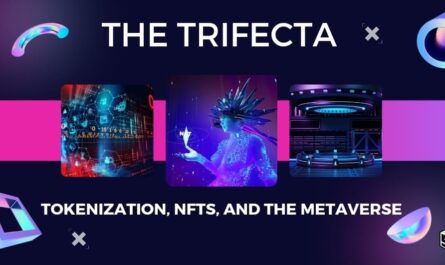A Practical Use Case for the Metaverse

Corporate Team Building and Conferencing in the Metaverse
SolidBlock recently held a team-wide metaverse costume party using an immersive 3D conference hall to gather staff as far-flung as Dubai, Israel, New York, Ukraine, and India.
In order to enable the voting on costumes, we created a DAO (decentralized autonomous organization), air-dropping specially minted ERC20 tokens to the wallets of each participant and, relying on the immutable nature of blockchain, facilitated an unhackable, unbiased and transparent voting mechanism.
This article will outline the steps involved in creating a DAO. It will also suggest that SolidBlock’s use case is a practical way for corporations to model future gatherings, events, and procedural votes in the metaverse.
Steps to Creating a DAO
Entering an immersive 3D metaverse space requires nothing more than a working computer with a camera and microphone. There are no technological barriers and all staff is able to navigate the space.
Here, in outline, are the steps taken to create this unique event.
- Hire a virtual conference hall.
- Decorate the virtual space with banners and photos that project the company’s unique products and services and represent the distinctive team ecosystem.
- Send an entrance link to all participants.
- Once participants have gathered and “toured” the space, invite them to face the “stage” where a company-wide address by the CEO can be screened.
- Request all staff to link their online wallets in a centralized, secure environment via a simple click of a button.
- Invite individual staff to the “stage” to share the costumes they are wearing in a live camera feed.
- Arrange for an air drop into each wallet a sum of tokens to be used in the voting.
- Instruct staff to vote for the costume or costumes they feel are deserving of their vote by sending their tokens proportionally to the costume wearers.
- Tally votes and declare a winner!
What is a DAO?
A DAO is a decentralized autonomous organization with no central leadership. Decisions are governed by a community organized around a specific set of rules enforced on a blockchain and are tallied by votes that are equally distributed from the bottom of an organization to the key players. DAOs are internet-native organizations collectively owned and managed by their members.
Generally, DAOs are created around the holders of specific tokens or cryptocurrencies. The DAO’s rules are established by a team of community members through the creation of smart contracts. These smart contracts highlight the foundational framework by which a DAO will operate. These contracts are verifiable, transparent, and publicly auditable; any potential member can view and follow the protocols at every step of a DAO’s voting process.
A DAO works without a hierarchy. There are many examples of DAOs, including freelance networks that pool their funds to pay for online magazine and software subscriptions; charitable organizations where members vote to approve how their donations will be spent; or venture capital firms that collectively decide on what companies to invest in.
In the case of SolidBlock, we created our DAO around the fun event of voting for the best-dressed staff member.
Opening a Wallet
SolidBlock’s staff chose to open wallets with Metamask. These wallets require very little technical understanding to use and are accompanied by supportive online assistance. Each wallet is assigned a 12-word code that is randomly generated and must be secured and remembered to allow access to the wallet. Each wallet then receives a numeric code that identifies it as a unique wallet. This id code allows the owner’s name to remain hidden.
Staff was asked to provide their numerical wallet id code in order to receive the air-dropped quantity of 100 SolidTokens into their accounts.
Air Dropping Tokens
For our purposes, SolidBlock minted a small number of ERC20 tokens that were distributed equally among the members who were participating in the social gathering. These tokens were airdropped—or disbursed all at once—to the online wallets that our staff had opened and identified as theirs.
Each participating staff member received 100 newly issued tokens that were then used to decide the vote.
The Vote
Once each staff member had received their tokens, we participated in a costume competition. The host of the party called up to the stage each staff member, in turn, to show off the costumes that we’d prepared and were wearing at the time. These costumes appeared in live camera feed from the stage, in the same way, that our cameras had been activated by sitting around a table in the main room.
Staff then used their tokens to vote on which individual we believed should win the costume competition. Fractional votes were encouraged, meaning we could vote proportionately for more than one person, using our tokens as signs of approval for one costume over another.
Votes were tallied and, as with any data on the blockchain, the results were immutable and transparent.
(And kudos to our Office Manager Moran Hertzanu Weiss for winning by a landslide!)
The Benefits
Unlike the small windows that we’ve become accustomed to with Zoom and other online video chat mechanisms, a meeting room in the metaverse offers several additional dimensions by moving away from broadcasting platforms to more interactive methods. The benefits of moving corporate meetings into the metaverse are significant and are enumerated here:
- Allows virtual team gatherings and provides a space for camaraderie despite distance.
- Overcomes the stigma of not understanding how new technologies work. The metaverse is easy and intuitive to use.
- Builds corporate culture by allowing employees to talk to a table of friends or intimately in one-on-one private conversations.
- Increases meeting productivity by doing away with jetlag.
- Creates a live, online and secure voting process on corporate positions.
Conclusion
Perhaps the most important benefit of meeting in the metaverse is the intangible idea of participating in something new and disruptive. No longer are our imaginations limited by the reality in which we live. The metaverse offers a new way of holding meetings and creating an atmosphere conducive to both serious corporate events and fun team-building party games. Either way, it’s a win-win.

 by
by 

